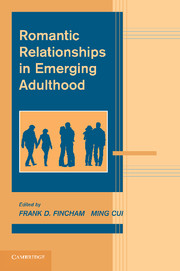Book contents
- Frontmatter
- Contents
- List of Contributors
- Foreword
- PART I INTRODUCTION
- PART II CONCEPTUAL AND METHODOLOGICAL FOUNDATIONS
- PART III THE DEVELOPMENTAL CONTEXT OF ROMANTIC RELATIONSHIPS IN EMERGING ADULTHOOD
- 6 Intergenerational Continuities in Economic Pressure and Couple Conflict in Romantic Relationships
- 7 Linking Parental Divorce and Marital Discord to the Timing of Emerging Adults' Marriage and Cohabitation
- 8 Family Differentiation in Emerging Adulthood: The Role of Romantic Relationships
- PART IV RELATIONSHIP PROCESSES IN EMERGING ADULTHOOD
- PART V PRACTICAL IMPLICATIONS
- Index
- References
6 - Intergenerational Continuities in Economic Pressure and Couple Conflict in Romantic Relationships
Published online by Cambridge University Press: 06 December 2010
- Frontmatter
- Contents
- List of Contributors
- Foreword
- PART I INTRODUCTION
- PART II CONCEPTUAL AND METHODOLOGICAL FOUNDATIONS
- PART III THE DEVELOPMENTAL CONTEXT OF ROMANTIC RELATIONSHIPS IN EMERGING ADULTHOOD
- 6 Intergenerational Continuities in Economic Pressure and Couple Conflict in Romantic Relationships
- 7 Linking Parental Divorce and Marital Discord to the Timing of Emerging Adults' Marriage and Cohabitation
- 8 Family Differentiation in Emerging Adulthood: The Role of Romantic Relationships
- PART IV RELATIONSHIP PROCESSES IN EMERGING ADULTHOOD
- PART V PRACTICAL IMPLICATIONS
- Index
- References
Summary
This chapter draws on three important themes in contemporary research on families and close relationships to provide new insights regarding important precursors of the quality of romantic unions during emerging adulthood. As Arnett (2004) noted, emerging adulthood, a period from 18 to 25 years old or perhaps even older, is a time of exploring possibilities and opportunities before assuming adult roles. In particular, Arnett (2004) suggested that it is a time for young people to explore their options in romance with different partners to discover what kind of person they would like to marry and to gain relationship experience before choosing someone to marry. Therefore, romantic relationships during this period could be self-focused and unstable. However, as Collins and van Dulmen (2006) pointed out, there is substantial continuity in close relationships (e.g., parent–child relationships, friendships, romantic relationships), and development in one period of life is built on development during an earlier time. This view is consistent with the life course perspective (Elder, 1985) that people's life trajectories are determined by a series of linked stages in which transitions from one state to another are always embedded in and have an impact on those trajectories. Therefore, the establishment of stability, satisfaction, and closeness in romantic relationships is one of the major developmental tasks during emerging adulthood.
- Type
- Chapter
- Information
- Romantic Relationships in Emerging Adulthood , pp. 101 - 122Publisher: Cambridge University PressPrint publication year: 2010



